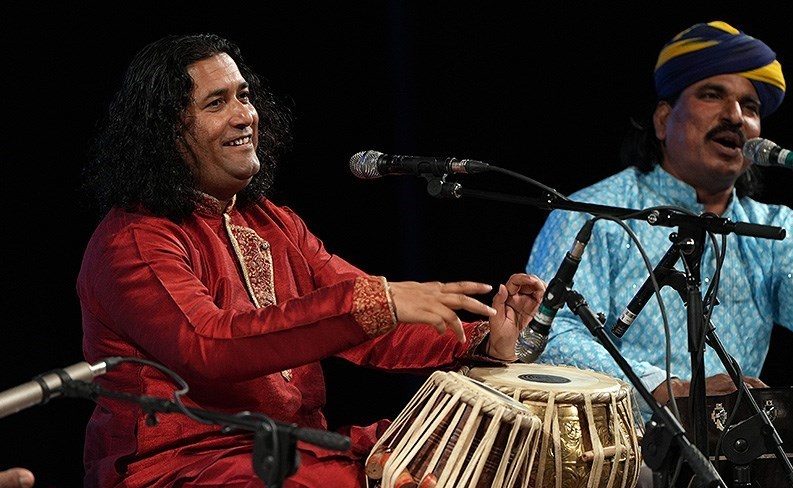
The 39th Fajr Music Festival last night hosted a performance by a group from India. The concert, titled “Songs of Rajasthan”, was led by Rahis Bharti. Bharti and his ensemble presented a captivating showcase of Rajasthani music. Although the audience was modest in number, the performance was so engaging that everyone present in Vahdat Hall stayed until the final piece, watching the concert with great enthusiasm.
The performance included selections of traditional Rajasthani music as well as Qawwali pieces from the region—both key highlights of the “Songs of Rajasthan” program.
Before Rahis Bharti’s arrival, we sent him a series of questions about his group’s music and the musical traditions of Rajasthan. He responded eagerly.
Here is the result of our conversation with Rahis Bharti:
At what age and with which instrument did you begin your musical journey?
I was born into a family with more than seven generations of musicians. I started music at the age of six. As a child, I would listen to the voice of my father, Ustad Rafiq Mohammad, and my grandfather, Ustad Rasool Baskhan. All of these experiences led me into the world of music.
You’re introduced as a representative of traditional Rajasthani music and have had a major impact in promoting it. What is your goal in bringing this music to different parts of the world?
Since I was born into a traditional family in Rajasthan, I’ve dedicated myself to promoting authentic Rajasthani music and dance. Preserving and spreading these traditions is very important to me. In today’s world, people tend to follow more modern music, but for over 25 years I’ve been working to introduce Rajasthani music to global stages. I want to offer the new generation a chance to hear this music in its most beautiful form.
Tell us about the characteristics of Rajasthani music. What instruments are typically used in it?
Rajasthani music is built on rhythm, percussive instruments, vocal performance, and traditional Rajasthani dance. The special energy in this music comes from performing it in authentic Rajasthani ways.
What’s your opinion on performing traditional Rajasthani music with different orchestration—perhaps influenced by Western classical music?
Rajasthani music is rooted in strong traditions. It’s a great idea to perform it with different orchestrations, or even fuse it with flamenco or rock bands. Doing so can bring a fresh flavor and new taste to the music.
We’ve already had cross-cultural experiences—working with flamenco, African music, and fusion orchestras. We stay rooted in our traditions, but it’s good to explore new realms alongside other cultures. This can build bridges between different heritages.
Are you familiar with Iranian music, culture, or musicians?
Among Iranian singers, I really love the voice of Master Shajarian. I greatly enjoy listening to him.
India and Iran share many cultural similarities. What do you think about their musical similarities?
Rhythms, instruments, and especially the mystical-spiritual approach are among the things that bring Indian and Iranian music closer together.
What pieces are you planning to perform at the 39th Fajr Music Festival for Iranian audiences?
We’ll perform devotional chants and Qawwali music from Rajasthan. Our message to the audience is that the world—despite different religions—is one family.
Interview By Farid Parish
